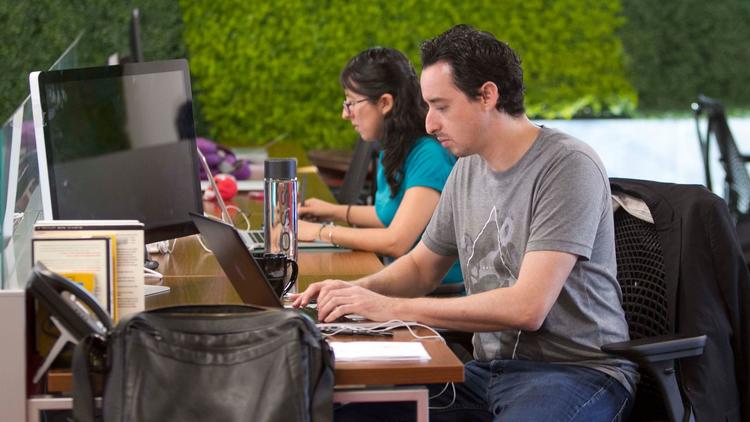dia, Vietnam and eastern Europe were all locations under consideration for a new software engineering center planned by the U.S. company Thermo Fisher Scientific. Central Mexico, with its strong software sector, also was a possibility.
“We were thinking Guadalajara, but hang on, Tijuana is just down the road,” said Mark Field, the company’s Carlsbad-based chief technology officer.
Over a year later, Thermo Fisher’s software center occupies two floors of a high-rise in the city’s Río Zone, where large picture windows frame views that reach all the way to the U.S. border.
More than 50 Mexican software engineers and a few designers, most in their 20s and 30s, work on programs for the company’s laboratory and medical instrumental instruments that are sold worldwide. Within months, the company hopes to have a staff of 110 on board, with long-term vision of up to 250.
President-elect Donald Trump has vowed to crack down on U.S. companies that send jobs overseas — and impose a 35 percent import duty on the manufactured goods of those that do. But here at the San Diego-Tijuana border, business and political leaders want to tell a different story: That Mexico’s gain creates benefits north of the border as well. They tout Thermo Fisher’s decision to locate in Tijuana as a prime example.
“It increases our competitiveness as a region, our attractiveness for additional foreign investment that could come as a result,” said Sean Barr, senior vice president of economic development at the San Diego Economic Development Corporation. “We are vastly more competitive as a region because of our relationship with Tijuana, that is indisputable.”
Mark Field, chief technology officer at Thermo Fisher Scientific, right, chats with software engineer Emilio Escobedo, born in Chula Vista but educated in Tijuana.
Mark Field, chief technology officer at Thermo Fisher Scientific, right, chats with software engineer Emilio Escobedo, born in Chula Vista but educated in Tijuana. (John Gibbins / San Diego Union-Tribune)
Thermo Fisher’s initial pilot phase, launched in September 2015, involved the hiring of 30 engineers. Satisfied with the results, the company moved ahead with a more permanent presence, formally opening its Tijuana center last September.
“We’ve been surprised at the talent, and how quickly they’ve ramped up to speed,” Field said in an interview this week.
Trump’s election “has not changed our vision,” Field said. “If people were to really look at what is going on, they would see it’s win-win for everyone.”
Tijuana has long been known as a major maquiladora manufacturing center, attractive to companies that want proximity to the U.S. market, and the source of a plentiful supply of low-cost labor. Initially viewed as assembly plants that employ low-skilled workers, maquiladoras have evolved over the past five decades, with more sophisticated production processes and more jobs for Mexican professionals.
“More and more, you see greater capacity for what can be developed in Mexico,” said Jorge Carrillo, an industry expert based in Tijuana at the Colegio de la Frontera Norte.
The arrival of Thermo Fisher marks another step forward for the city — but also for the region — say economic development proponents on both sides of the border. If Thermo Fisher finds success, other companies might follow, the reasoning goes. “It may get a lot of attention from other leaders in the software industry, saying, ‘Hmmm, maybe I could do this too,” Barr said.
A key factor for attracting future employers will be developing a strong local force of skilled and experienced experienced software engineers, said Martin Kenney, a UC Davis professor who studies global labor markets. While “a great start,” at this point ‘it’s not a big deal unless they can go to the next level,” he said.
Thermo Fisher won’t discuss salaries they are paying in Tijuana, but those in the industry say an engineer hired out of school could earn close to $9,000 a year, with senior engineers earning up to $30,000.
San Diego has some 30,000 people employed in the software industry, with an average income at over $121,000, said Kelly Cunningham, chief economist for National University System’s Institute for Policy Research.
“We’d certainly rather see these jobs in San Diego,” Cunningham said. “If they can’t do it here, it’s better to open in Tijuana, where we get some spillover effect, that’s better than the alternative of going to Asia.”
Headquartered in Waltham, Mass., Thermo Fisher has more than 50,000 employees worldwide, and annual sales that top $17 billion. Like other companies undergoing transformation to digital and cloud-based technology, Thermo Fisher has growing software needs, and the competition for talented software engineers has been fierce.
Hiring engineers in the United States, “is prohibitively expensive,” Field said. Without the option of going abroad, “we wouldn’t be doing the things we’re doing, the innovation wouldn’t be happening,” Field said.
Establishing a center in Tijuana creates jobs in San Diego, where more than 15 software engineers now work in the company’s Carlsbad office, Field said. “We have hired more people in the U.S. because of this,” he said. And there are other benefits to be had by creating jobs in Tijuana, he said, when the Mexican employees head across the border to spend some of their earnings in San Diego.
Thermo Fisher currently has a staff of 250 engineers working out of a center in Bangalore, India. In deciding to expand, “we looked at southeast Asia, we looked at eastern Europe,” but Tijuana’s proximity to the Carlsbad office was a powerful draw, allowing the possibility of face-to-face meetings between the U.S. and Mexican engineers and the ability to work in the same time zone.
“I was aware they had great software engineers in Mexico,” said Field, who previously headed a software center in Guadalajara for the California-based Oracle Corporation. “The question was, could we find them in Tijuana?”
Both the San Diego EDC and its Tijuana counterpart, the Tijuana Economic Development Corporation worked to attract Thermo Fisher to Tijuana. Barr credits the University of California San Diego’s Center for U.S.-Mexican Studies “as a key critical partner in this whole enterprise,” analyzing Tijuana’s software engineering capability, and “helping Thermo Fisher understand the landscape of northern Baja.”
The company’s Tijuana staff is currently a mix of local hires and others recruited from other parts of Mexico. Luis Brito, 29, relocated from Cuernava in central Mexico for the chance to work at Thermo Fisher. “Many people told me, ‘Why Tijuana?’ I like the way they work here, doing clean and quality software.”
Carlos Almonte, 25, a graduate of the private Cetys University in Tijuana, said the chance to work on cloud computing captured his attention. “It’s way more interesting and challenging compared to where I was working,” he said.
Tijuana’s pool of English-speaking engineers, and city’s geographical proximity to California offer advantages, but compared to other parts of Mexico, efforts to create a software cluster “have been pretty scattered,” said Jorge Arroyo, co-founder of ArkusNexus, a 13-year-old Tijuana software development company whose 120 engineers work with a dozen U.S. companies.
Thermo Fisher’s decision to locate in Tijuana “as a region overall it pushes us forward,” Arroyo said. “There’s a lot of raw talent to be developed.”





